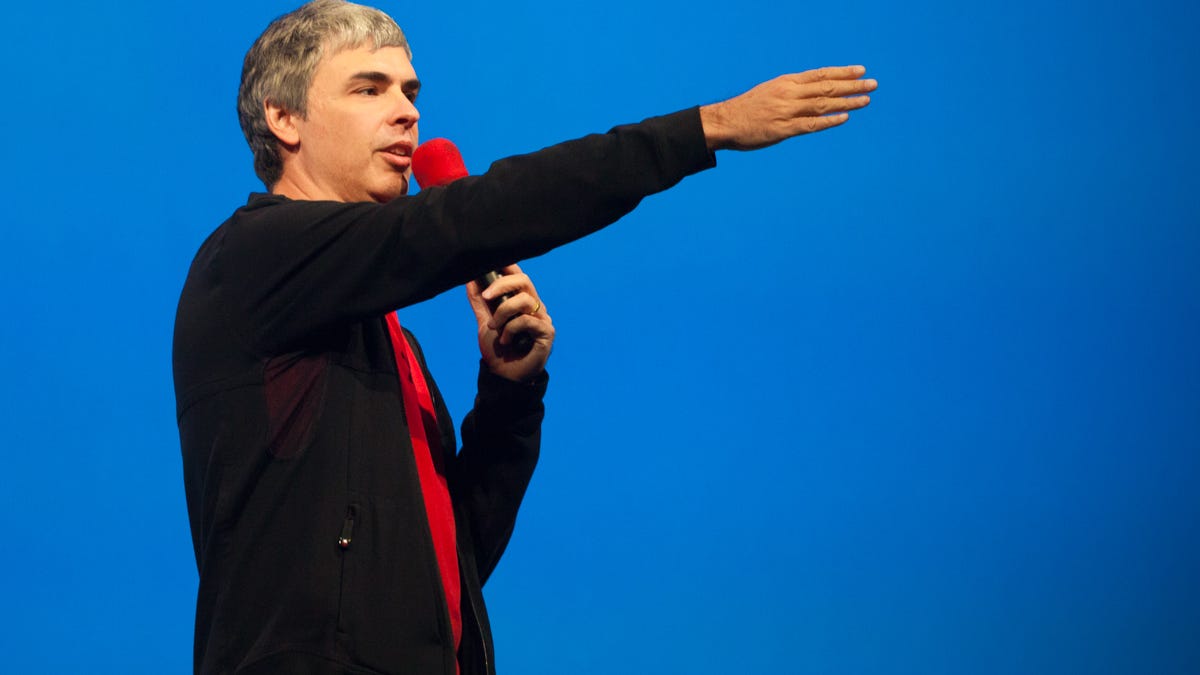Larry Page's reality distortion field
Implicit in the Google CEO's vision is that the future will run better on Google, and he will marshal all his forces to try to make that a reality.

Larry Page is turned off by treating his life's work as a kind of sporting competition. In his way of thinking, battles over Android vs. iOS or Google+ vs. Facebook are a petty distractions, glorified in the press. They generate negative energy, which leads to a diminished capacity to innovate and focus on moonshots, such as self-driving cars, that have the potential to change the world.
"Every story I read about Google is us versus some other company or some stupid thing," the Google co-founder and CEO told 6,000 developers at Google I/O in his surprise appearance on stage Wednesday. "Being negative is not how we make progress. The most important things are not zero sum. There is a lot of opportunity out there."
His annoyance with media coverage and the focus on competiton isn't new. In an interview with Wired in January, Page offered a more detailed version of his business philosophy:
If you read the media coverage of our company, or of the technology industry in general, it's always about the competition. The stories are written as if they are covering a sporting event. But it's hard to find actual examples of really amazing things that happened solely due to competition. How exciting is it to come to work if the best you can do is trounce some other company that does roughly the same thing? That's why most companies decay slowly over time.
Page is right. There is a tremendous opportunity out there, and negativity is a downer. And, there are too many me-too products that don't add much value to the planet. But let's get real. Page is the commander of a vast army of engineers and product managers primed to colonize the planet with Googliness and vanquish rivals to the extent antitrust laws allow. But Page would rather the focus be on the fashioning of products and services rather than Google's growing power and database.
Right now, Google is targeting Apple, Amazon, Facebook, Microsoft, and a host of other companies who are vying for success in the coming decades.
Page seems to exist in a bubble, above the fray as companies compete so they can survive to live another year. He has a good perch -- Google generated more than $50 billion in revenue in 2012 and its stock price hit a record high this week, above $900. At the same time, he is plotting Google's course to dominate in areas beyond search, and become the de facto standard for the Internet as Microsoft was for desktop in another era.
Page has poured an enormous amount of resources into improving and integrating Google's growing portfolio of products -- Gmail, Hangouts, Maps, Google+, voice search with Google Now, Google Music All Access, Android, Chrome and Google Apps, Drive, Play, Shopping, Wallet, Glass and Fiber.
Add up all the pieces, and it's clear that mild-mannered, soft-spoken Page is not ceding any category to the competition. The new features and interfaces for Google+, for example, indicate that the company isn't backing off from trying to unseat Facebook as the social layer for the Internet. With Gmail, Google Now, and Maps on the iPhone and iPad, Google is making Apple look more like just a hardware company.
Like Steve Jobs, Page has his own reality distortion field. He doesn't concern himself with incrementalism or just aping the competition. His ambitions, and "ask" of his team, are to focus on breakthroughs, or in sporting terms, big wins like the Macintosh and iPhone were for Apple and self-driving cars, Knowledge Graph, and Glass might be for Google.
But at the same time Page is intensely competitive and intimately aware of what rivals are doing on the ground. He is out to trounce Facebook and trump Apple's iOS by grinding out better products, but not in isolation or without incrementalism. The newly designed Google+ takes its cues from Pinterest, Instagram, and Twitter.
And when it comes being a fierce competitor, Google has a modest rap sheet of cases where it has been fined or has had to make changes to its policies because of its alleged anticompetitive practices. For example, in January Google agreed to modify some of its business practices that were considered anticompetitive by the Federal Trade Commission, and the European Union is pursuing legal remedies related to Google promoting its own services at the expense of competing services.
In his remarks at Google I/O, Page said that "technology should do the hard work, so people can get on doing the things that make them happiest in life." As an example, he talked about how self-driving cars will "change our lives and the landscape," and allow for "more green space, fewer parking lots, greater mobility, fewer accidents, more freedom, [and] fewer hours wasted behind the wheel of the car."
Implicit in Page's vision is that the future will run better on Google, and he will marshal all his forces to try to make that a reality.

